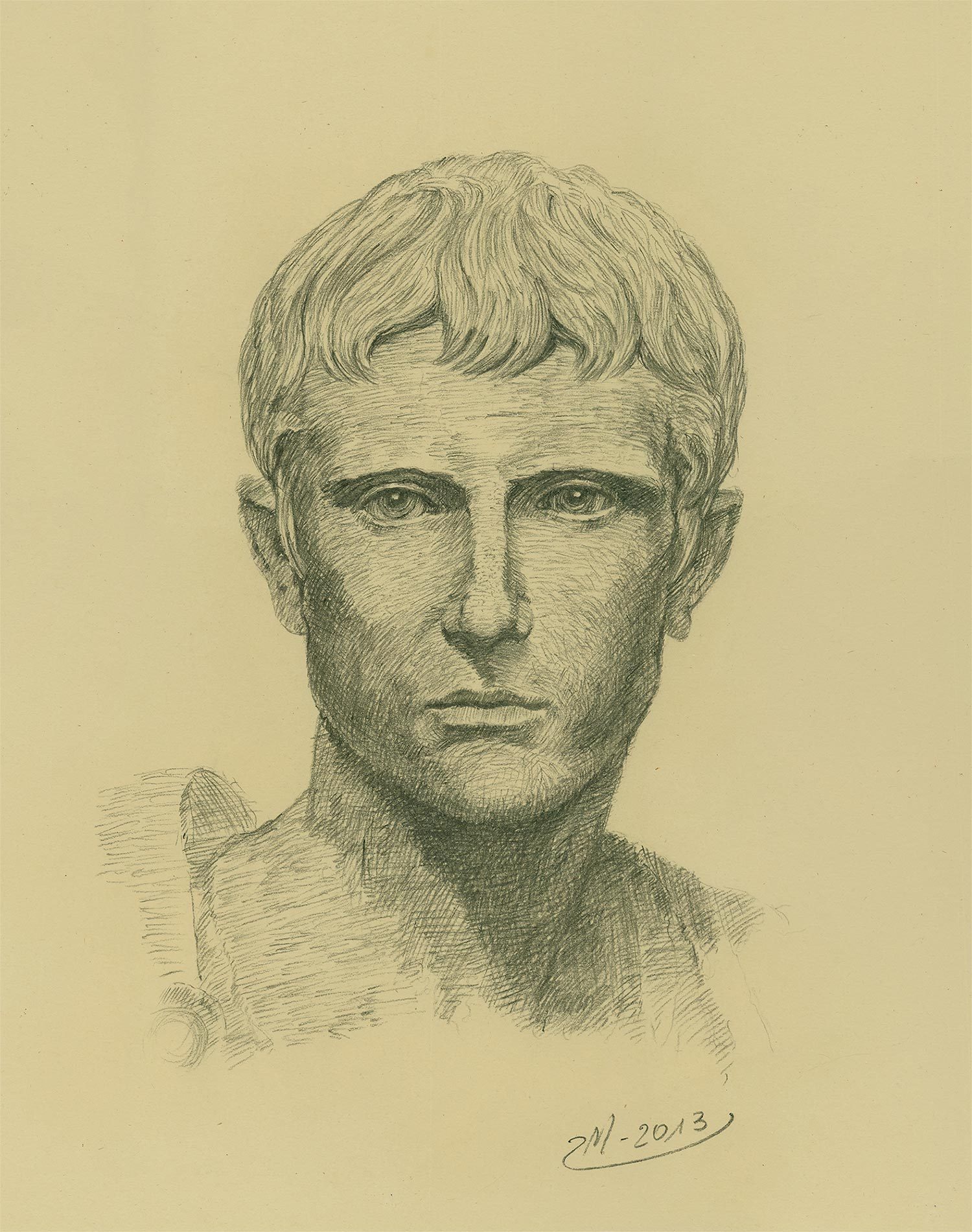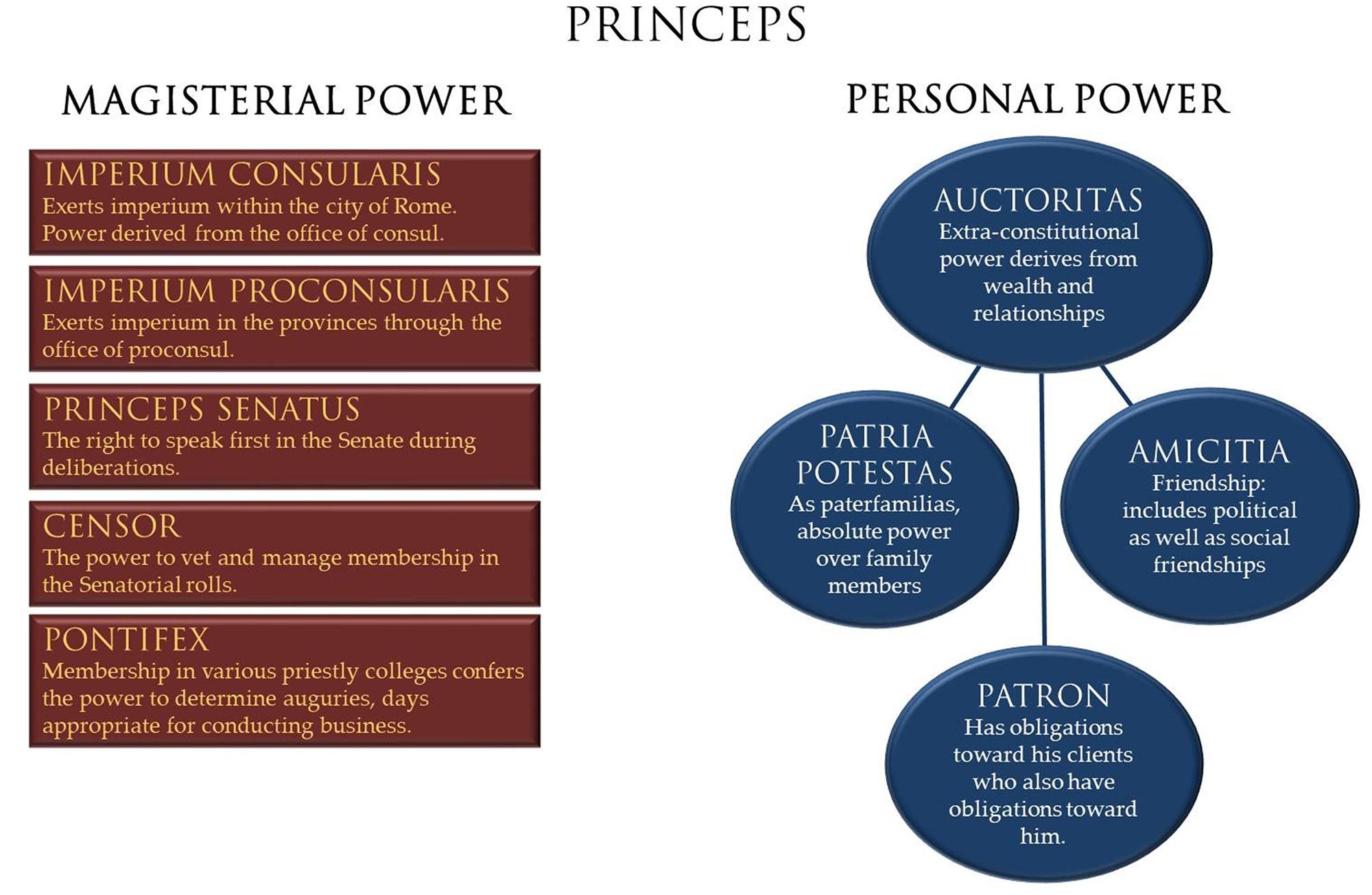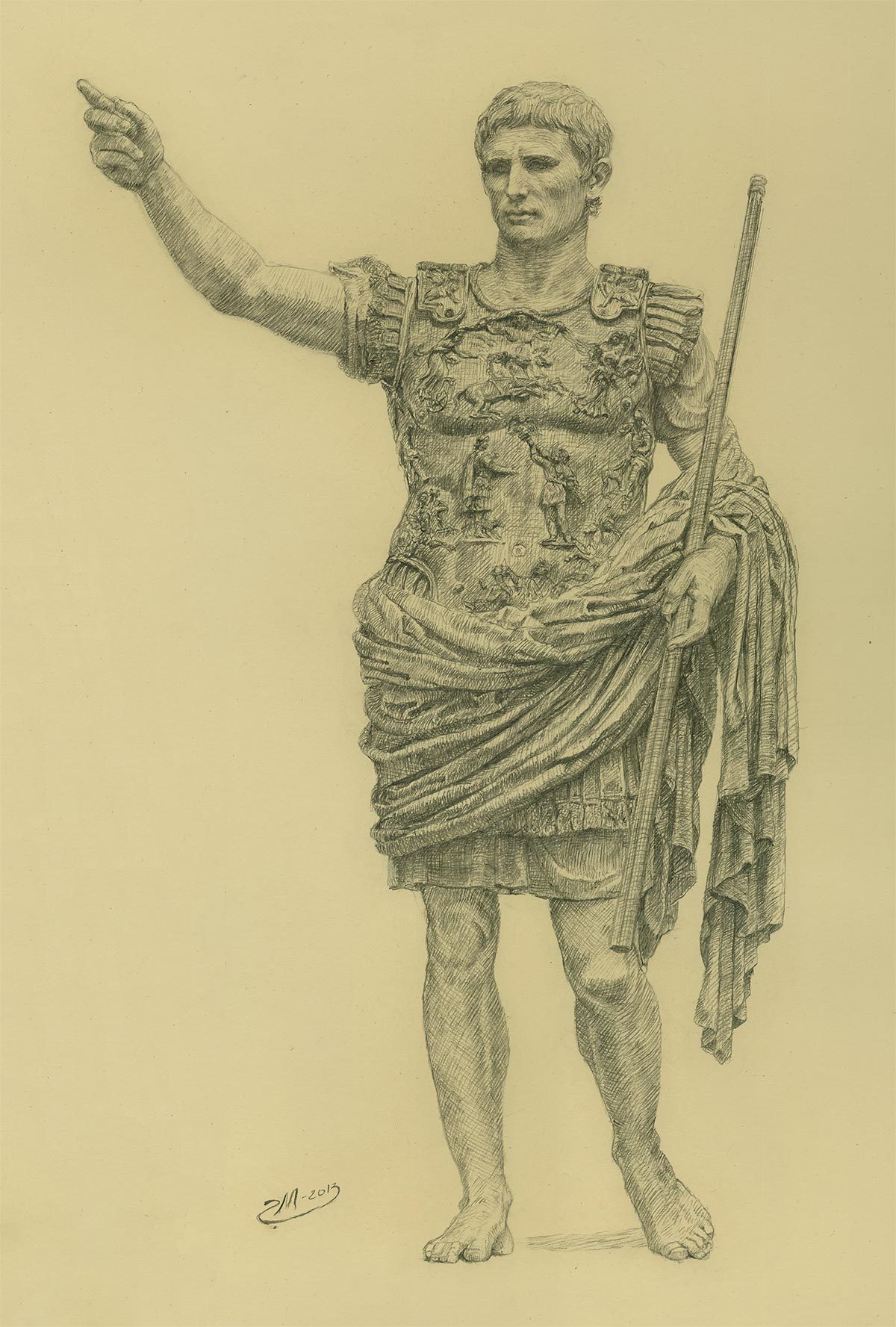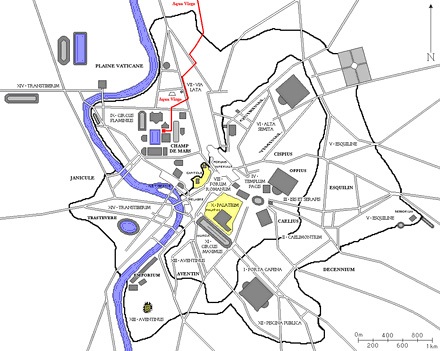First Princeps (Augustus)
Gaius Julius Caesar Octavianus
(27 BC-14 AD)
Augustus.
Gaius Julius Caesar Octavianus. Drawing by Z. Michalski for Pro Romanis, GENCYA Corp. User may use this image but only under the following conditions; that the image be accompanied by the following copy and link to this website: “This image is the property of Pro Romanis, GENCYA Corp. It may be reproduced for educational purposes only. The original may be viewed at www.proromanis.com.”
27 BC
The First Settlement
This is the first formal agreement between Octavian and the Senate as pertains to governmental changes that begin the transition from Republic to Principate. These changes are incremental but transformative. The offices of the cursus honorum (Quaestor, Aedile, Praetor, Propraetor, Consul, Proconsul, and Censor) are preserved. But Octavian is able to hold some of these offices simultaneously and over extended periods of time. In the right combination (that of Consul, Proconsul and Censor), these offices give him de jure executive, legislative and judicial power in addition to de facto power (his control of key provinces, of most of the legions and his great personal wealth). Other key elements of power relate to the personal qualities of the man; his auctoritas, his amicitia. These are not the formal attributes of any of the magistracies of the cursus honorum, but rather the necessary personal qualities that a candidate must have in order to hold those offices in the first place.
“Optimi status auctor” = the best author of the state (Octavian). Syme R, The Roman Revolution. p. 319. Oxford University Press. Kindle Edition. Location 5116 of 14559.
Syme, Ronald (1963-03-26). The Roman Revolution (p. 320). Oxford University Press. Kindle Edition.
The First Constitutional Settlement,
27 BC – Sources of Power
Powers Accruing to Octavian
Imperium consulares: refers to the authority of a consul. This office gives him imperium, legal authority, within the boundaries, within the pomerium, of the city of Rome. The office of Consul has administrative, legislative and judicial as well as military powers. Certain religious duties also come with the office. During the time of war, a consul has imperium outside of Rome when in command of the legions. Octavian exercises the consular imperium (imperium consulares) in the following years: 43, 33, 31, 30, 29, 28, 27, 26, 25, 24, 23, 5, and 2 BC. This is not unprecedented. Pompey exercised similar consular authority. In later years, when Octavian exercised only proconsular imperium, he was given a senatorial dispensation and allowed to exercise consular imperium as well.
The imperium of consuls is derived, theoretically at least, from the people who were represented by the Assembly, Comitia Curiata, which passes a law at the beginning of the magistrate’s term of office called the lex curiata de imperio.*
*It has been argued that the lex curiata de imperio had no legal force but was merely a pro forma recognition that an elected magistrate already possessed imperium in his person. This possession of imperium was implied by the magistrate’s election and by the personal qualities that allowed him to stand for and acquire office.
Imperium maius: meaning great legal authority; this power usually adheres to the office of a senior consul, and to more rarely held offices—Master of Horse and Dictator. A magistrate with imperium maius outranks every other magistrate.
Imperium proconsulare: applies power, imperium (legal authority), that a proconsul can exercise in the provinces but never within the boundaries of the city of Rome.
The Senate is reduced in power to a council of state; primarily an advisory body and a source of administrative talent. With executive power concentrated in one person, Octavian’s government takes on the characteristics of his private household. Here is a description from Mommsen:
The Roman house was a machine, in which even the mental powers of the slaves and freedmen yielded their produce to the master; a master, who knew how to govern these, worked as it were with countless minds. It was the beautiful ideal of bureaucratic centralization; which our counting-house system strives indeed zealously to imitate, but remains as far behind its prototype as the modern power of capital is inferior to the ancient system of slavery. Caesar knew how to profit by this advantage; wherever any post demanded special confidence, we see him filling it up on principle—so far as other considerations at all permit—with his slaves, freedmen, or clients of humble birth.
Mommsen T. The History of Rome (Volumes 1-5). Translated by William Purdie Dickson. E-book #10706. E-text prepared by David Ceponis. Pg. 987. Available at http://www.gutenberg.org/cache/epub/10706/ pg10706.html. Accessed 12/29/2012.
In bypassing the Senate, Octavian depended upon his “familia” to get things done. This extended to the management of state finances where he employed competent but socially insignificant “friends” like the Phoenician merchant Lucius Cornelius Balbus from Gades.
The allocation of governorships of the provinces was somewhat different. Here it depended upon the nature of the province. Egypt was unique in its organization and wealth. Because it was a command economy and extremely wealthy, it was governed directly by Octavian and his representatives.
This personal system of Octavian was also applied to the provinces and was far superior to the senatorial system under the republic; an annual visitation of kleptocrats who extracted what they could during their 12-month tenure, leaving behind destitution and misery.
Octavian assumes the title of Augustus
He is given imperium to directly govern select provinces (designated as imperial provinces, usually of strategic value) through propraetors (Spain, Gaul, Syria along with Cilicia and Cyprus, and Egypt) for 10 years.
The following provinces are designated as senatorial provinces, to be governed by members of the senate, allocated by lot:
Africa (consular), Numidia, Libya and Cyrene, Illyricum, Macedonia, Sicily, Crete, Asia (consular), Greece with Epirus, Baetica, in Spain, Bithynia and Pontus, Sardinia and Corsica
He is given the right to declare war and make treaties; the right to appoint military tribunes from the Equites class; appoint procurators (for taxing the provinces).
Power restored to traditional magistracies, but Augustus is given proconsular imperium maius, power superior to all other magistrates. He is also given tribunician power (tribunicia potestas) (the right to veto any proposed legislation and the right to introduce legislation).
Consular elections are resumed
Augustus Prima Porta.
Drawing by Z. Michalski for Pro Romanis, GENCYA Corp. User may use this image but only under the following conditions; that the image be accompanied by the following copy and link to this website: “This image is the property of Pro Romanis, GENCYA Corp. It may be reproduced for educational purposes only. The original may be viewed at www.proromanis.com.”
Building Program in the Campus Martius
26 BC
Octavian prosecutes the war in Spain against the Cantabrians and Asturians
The war lasts from 28 BC to 19 BC. War brought to a close by Agrippa through “massacre and enslavement…upon a desolated land.”
[Ronald Syme, The Roman Revolution Kindle Edition Page 332 of 580. Location: 5322.]
23 BC-19 BC
Agrippa leaves Rome for his proconsular appointment in Syria in the East
Agrippa perceives Augustus promoting Marcellus, perhaps at his expense. With Marcellus’ marriage to Julia (Augustus’ daughter), Agrippa decides to take a proconsular appointment in the East.
The Second Settlement
The second constitutional settlement was a clarification of Octavian’s powers vis-à-vis the state. With his resignation of consular office, which he had held continuously, Octavian was able to exercise imperium without holding consular office.
Tribunicia potestas: tribunician power is derived from the people. Tribunes of the plebs, tribuni plebis, were nominated in the Assembly and voted on by the plebs. The tribune’s person was inviolate and protected by the plebs. By the time of Octavian, tribunes could veto any law, whether originating in the Senate or the Assemblies or with any magistrate.
- Resignation of the consulship (After 23, Augustus only held the office twice, in 5 B. C. and 2 B.C., to preside over the introduction of his adopted sons into public life.)
- In ROME: the grant of tribunicia potestas (the status and privileges, but not the burdens of the office, of a Tribune of the People). This gave Augustus the right to veto any actions of any magistrate(s), Senate, or Assemblies that did not suit him.
- Special grants (to compensate for the powers lost with the renunciation of the annual consulship):
- The right to a seat on the Consuls’ platform at the front of the Senate House
- The right of speaking first at a Senate Meeting (ius primae relationis)
- The right to summon a meeting of the Senate
- The curia annonae, care of Rome’s grain supply (which brought patronage over the Plebs)
- In the Provinces: imperium maius proconsulare
- The right to govern his own provinces and armies
- The right to interfere in any other governor’s province when Augustus deemed it necessary (cf. the Cyrene Edicts)
19 BC
New aqueduct, Aqua Virgo, dedicated by Agrippa
Aqua Virgo.
New aqueduct dedicated by Agrippa.
Aqua Virgo, the aqueduct built by Agrippa is indicated in red. This aqueduct ceased to function with the fall of the Western Roman Empire (476 AD) but was restored during the Renaissance. Today it feeds, among other things, the Trevi fountain.
16-7 BC
Tiberius and Drusus conquer Pannonia and campaign against Germanic Tribes.
12 BC
Marcus Vipsanius Agrippa dies.
5 AD
Tiberius conquers Germania inferior
6 AD
Bellum Batonianum (War of the Batons)
Military conflict between an alliance of Illyrian tribes (Andizetes, Breuci, Daesitiates, Dalmatae, Dardanians, Japones, Liburnians, Pannonians, and Pirustae) and Rome. The war lasted from 6 AD to 9 AD. The war was, in fact, a revolt against harsh Roman rule.
The revolt started when Daesitiates troops, destined for the conflict with the Germans in the north under the command of Tiberius mutinied and defeated a Roman force sent against them. Marcus Valerius Messalla Messallinus, the governor of Dalmatia and Pannonia, advanced with an army. Augustus raised a second force under Germanicus. The Romans sent 100,000 men. Germanicus and his army were defeated. Tiberius came to his aid and ended the war by taking the city of Andetrium forcing Bato the Daesitiate and his forces to surrender. The Illyrian tribes were broken up into different groups. Many tribe members were sold into slavery. Bato was exiled to Ravenna. The Roman soldiers who fought in the Bellum Batonianum campaign were unhappy with their retirement allotments (land in Pannonia) and they mutinied. Tiberius, now Princeps, sent his son Drusus to deal with the situation.
Judaea becomes a Roman province
Germania inferior and the Rhine secured by Germanicus
9 AD
Three Roman Legions (XVII, XVIII and XIX) under the command of Publius Quinctilius Varus were exterminated by Arminius leading an alliance of Germanic tribes—the Cherusci, Marsi, Chatti, Bructeri, Chauci, Sicambi and Suebi—in the three-day battle of the Teutoberg forest.
14 AD
Augustus dies. Tiberius becomes Princeps.




